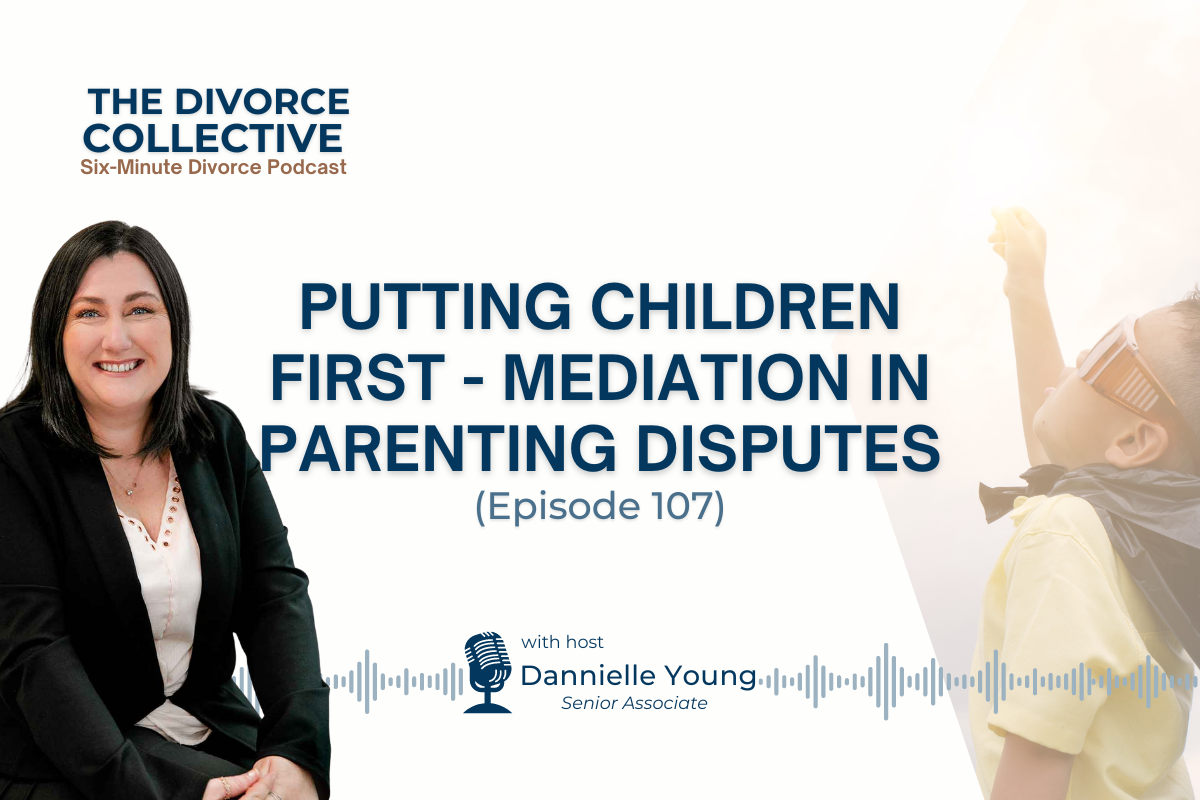For this week’s episode of the Divorce Collective Podcast, our host, Dannielle Young, Senior Associate at Collective Family Law Group, will take you through the advantages of mediation in Family Law.
Traditionally, family law disputes are resolved through litigation, a process often characterized by high costs, lengthy proceedings, and heightened emotional turmoil for all parties involved. However, an alternative approach gaining recognition and popularity is mediation, offering a more collaborative and amicable path to resolving family law matters.
Benefits of choosing mediation over litigation in family law disputes:
- Preservation of Relationships: Unlike litigation, which often escalates conflict and strains relationships, mediation fosters open communication and cooperation between parties. Through facilitated discussions, mediation helps families maintain civility and respect, preserving important relationships, especially crucial in cases involving children.
- Control and Empowerment: In mediation, parties have greater control over the outcome of their dispute. Unlike litigation, where decisions are imposed by a judge, mediation empowers individuals to actively participate in crafting solutions that meet their unique needs and circumstances. This sense of control fosters ownership of the outcome and promotes long-term satisfaction with the agreement reached.
- Cost-Effectiveness: Litigation can be financially draining, with legal fees, court costs, and expert witness expenses quickly accumulating. In contrast, mediation typically incurs lower costs as it involves fewer formal proceedings and reduces the need for extensive attorney involvement. By minimizing expenses, mediation allows families to allocate resources towards rebuilding their lives post-resolution.
- Efficiency and Timeliness: Court dockets are often congested, leading to delays in resolving family law disputes through litigation. Mediation offers a more efficient alternative, enabling parties to schedule sessions at their convenience and work towards a resolution at a pace that suits their needs. This streamlined process expedites the resolution of disputes, saving time and reducing stress for all involved.
- Confidentiality: Mediation proceedings are confidential, providing a safe and private environment for parties to discuss sensitive issues openly. Unlike courtroom proceedings, which are a matter of public record, mediation affords parties the freedom to explore creative solutions without fear of public scrutiny. This confidentiality fosters trust and encourages candid communication, facilitating meaningful progress towards resolution.
- Customized Solutions: Family dynamics are diverse and complex, necessitating solutions that are tailored to the specific circumstances of each case. Mediation allows parties to craft creative and flexible agreements that address their unique needs and concerns, rather than adhering to rigid legal precedents. This customization ensures that the final agreement is fair, sustainable, and conducive to the well-being of all family members.
- Reduced Emotional Strain: Litigation can be emotionally taxing, exacerbating tensions and prolonging the healing process for families. In contrast, mediation promotes a supportive and empathetic environment, where parties are encouraged to express their emotions and work towards mutual understanding and acceptance. By minimizing conflict and promoting cooperation, mediation helps alleviate the emotional strain associated with family law disputes.
In conclusion, mediation offers a host of advantages over litigation in resolving family law matters. From preserving relationships and empowering parties to controlling costs and promoting efficiency, mediation provides a constructive framework for families to navigate disputes with dignity and respect.
Tune in with Dannielle Young to gain insights in embracing the principles of collaboration, communication, and compromise, mediation paves the way for healing and reconciliation, laying the foundation for a brighter and more harmonious future.





